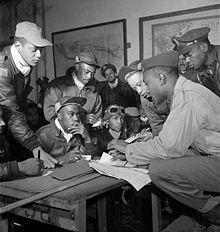Listen to Lt. Col. William Holloman and Lt. Col. Alexander Jefferson:
Audio clip: Adobe Flash Player (version 9 or above) is required to play this audio clip. Download the latest version here. You also need to have JavaScript enabled in your browser.
“Star Wars” creator George Lucas spent more than twenty years trying to bring the story of the Tuskegee Airmen to the big screen. “Red Tails,” which highlights the African American pilots who flew in World War II, is premiering this weekend in 2,500 theaters across the country.
Appearing on The Daily Show, Lucas told host Jon Stewart that he had to self-finance the film because the big distributors wouldn’t take a chance on “an all-black movie [with] no major white roles in it.” Lucas said he was told by the industry’s powers-that-be (a group which under normal circumstances includes himself), “We don’t know how to market a movie like this.”
The effort to spread the word about the African American pilots and soldiers who fought in World War II was a driving force behind the creation of the Tuskegee Airmen, which “formed in his house in 1972,” Ret. Lt. Col. William Holloman said while sitting beside Ret. Lt. Col. Alexander Jefferson.
“[We wanted] to let people know about our participation… because white America did not know that blacks flew in World War II,” Holloman told me after a 2010 talk he and Jefferson gave at an event sponsored by the DC Chapter of the National Association of Black Veterans.
The Tuskegee Airmen served at a time when “segregation and discrimination were rampant across the United States below the Mason-Dixon Line,” said Jefferson.
On his nineteenth mission, Jefferson’s plane was shot down and he was captured by the Nazis and held as a prisoner of war for nine months. “The Germans didn’t have very much food,” Jefferson said. “If it hadn’t been for International Red Cross food parcels we would have died.”
The Geneva Conventions, which helped save Alexander’s life nearly 70 years ago, remain important today and should be followed by all countries, including the U.S., explained Holloman, who passed away two months after our interview.
On the subject of the U.S. military’s indefinite detention of suspected terrorists, Holloman said, “They need to have a trial. If they find them guilty, punish them. If they’re not guilty, release them. But don’t continue to hold them. That is terrorism in itself.”

